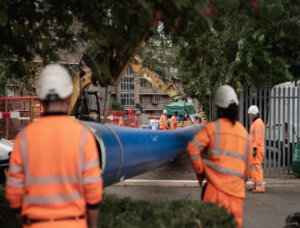Thames Water reaches final stage of £21 million water mains pipe replacement plan

The multi-million-pound upgrade, which includes three large trunk mains, will build resilience across the local area and keep taps flowing for customers.
The original Victorian water pipes were laid in the 1800s and have survived the London bombings in both World War I and World War II. Thames Water is investing in innovative technology to reline its aging pipes, with the aim to reduce leakage across London and keep customers in supply.
Thames Water is using innovative Die Draw technology to improve its Victorian infrastructure, bringing it up to date for the 21st century.
The method requires two excavation points, whereby engineers dig down at either end of the existing pipe, to avoid digging up miles of road along some of London’s busiest streets, reducing noise and disruption for residents in the process.
The pipe is cleaned out and a new plastic liner is pulled through which expands to fit, reducing the risk of leaks and improving resilience.
Esther Sharples, Operations Director for London said: “We’re committed to reducing leakage across London, which is why we are upgrading our network of aging pipes, some of which are over 150 years old.
“Due to a history of leaks in the area, it was clear we needed to urgently upgrade our pipes. This multi-million-pound investment will build resilience for the future and keeping taps flowing for our customers.
Thames Water has taken a collaborative approach to the project, working in partnership with its suppliers, TfL, and three London authorities to carry out the extensive upgrades, including Haringey Council, Hackney Council, and Islington Council, with the work covering all three areas.
Nick Owen, TfL's Head of Network Performance, said: “London's road network plays an absolutely vital role in keeping the capital moving, which is why we work closely with utility companies to reduce the impact of roadworks.”
Speaking on the project, Tom Shanahan, project manager at Morrison Water Services, said: “This has been a great example of a project team pulling together to use technology to solve a complex issue.”












